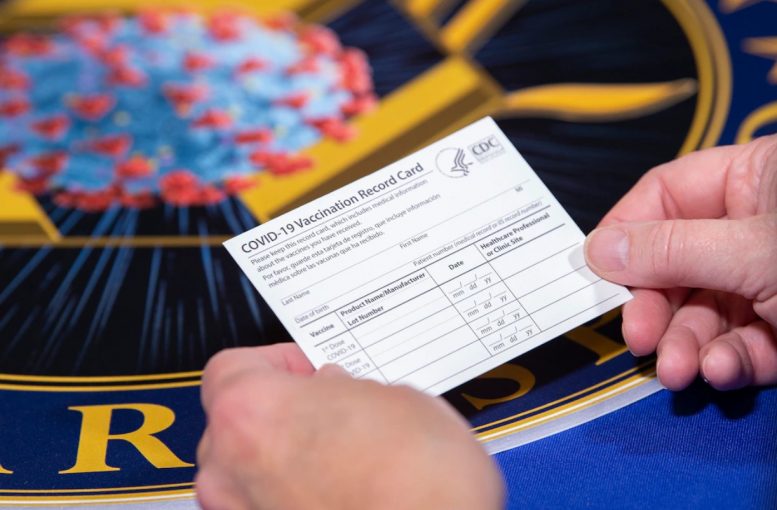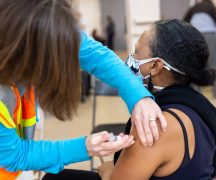One month ago, nearly 475,000 Ohioans over seven days marched into small pharmacies and mass clinics alike around the state to get vaccinated against COVID-19.
Each week since, the number of newly “vaccine-started” Ohioans has tumbled. Just 152,000 Ohioans were vaccinated during the week ending April 25, according to data from the Ohio Department of Health.
As the vaccine rollout pace slows, only about 4.7 million of Ohio’s 11.7 million residents have begun the vaccination process.
“We clearly have a lot more vaccine than we have demand,” Gov. Mike DeWine said to reporters Monday.
The week ending April 25, the most recent with complete data, shows vaccine uptake at its lowest rate since mid-February, when a nasty winter storm swept the country and temporarily closed vaccination sites.
Vaccines protect individuals against COVID-19 but, at a certain threshold, can protect those in a population who haven’t yet or cannot receive the vaccine. Experts have estimated this threshold, known as herd immunity, to be somewhere between 70% and 90%.
While the first four months of the vaccine rollout were defined by scarcity, uptake rates began to plunge nationally in April.
DeWine, noting the uptake has declined “dramatically,” said herd immunity is more of a gradient than a black-and-white concept. The formula, he said, is simple.
“The more people that get vaccinated, the harder it is for this virus to spread,” he said. “The more people that get vaccinated, the fewer people that are going to die.”
All told, more than 19,200 Ohioans have died from COVID-19, and nearly 57,000 have been hospitalized. The Ohio Department of Health reports more than 1 million residents have been infected, though the true count is likely much higher.
Ohio is in the middle of the pack in terms of states and percentage of the population who have received at least one dose.
On the low end: Mississippi (31%), Louisiana (32%), Alabama (33%), Wyoming (34%) and Idaho (34%) according to New York Times Vaccine Tracker data.
On the upper end: New Hampshire (61%), Massachusetts (58%), Vermont (57%), Connecticut (56%) and Maine (55%).
The U.S. Census Bureau has been surveying Americans’ attitudes about the COVID-19 vaccine. As of March 29, nearly 20% of Ohioans expressed hesitancy toward the vaccine, compared to about 15.6% nationally. The bureau is slated to release fresh data later this week that will give a sense of whether the trend is improving or worsening.
Similarly, polling data from Kaiser Family Foundation estimates 13% of Americans will “definitely not” get the vaccine and another 7% only will if they’re required to. Other data from Gallup estimates that 26% of Americans are unwilling to take the vaccine, down from about 35% when they were authorized for use in December.
***
lso from Ohio Capital Journal:
Lawmakers propose bill to crack down on cell phone use while driving
Ohio lawmakers are proposing stricter rules against cell phone use while driving, with a goal of cracking down on distracted driving in the state.
Legislation from state Reps. Cindy Abrams, R-Harrison, and Brian Lampton, R-Beavercreek, would prohibit using electronic devices while driving in most circumstances. Law enforcement could ticket drivers for even holding their phones while driving.
This is the latest effort to strengthen distracted driving laws in Ohio, which has seen a rise in related crashes over the past decade. The State Highway Patrol reported more than 66,000 crashes between 2016 and 2020 that involved a distracted driver. This has led to 212 traffic fatalities over that five-year span. READ MORE
Statute of limitations on rape targeted again in legislation
Two Democrats want to expand the statute of limitations on rape cases, legislation that has entered the Statehouse several times before, to no avail.
State Reps. Tavia Galonski, D-Akron, and Jessica Miranda, D-Forest Park, re-introduced legislation regarding the statute of limitations for criminal and civil and sex crimes, with their bill eliminating any time limit on filing charges or lawsuits.
The bill would also remove spousal exemptions for rape, sexual battery and other sex crimes, all of which has been a legislative effort in the past.
“Justice for victims of sexual assault should not have an expiration date,” Galonski said in a statement on the bill. “This legislation right-sizes our laws to empower some of the most vulnerable Ohioans who were not able to receive timely justice under the current statutes.” READ MORE





